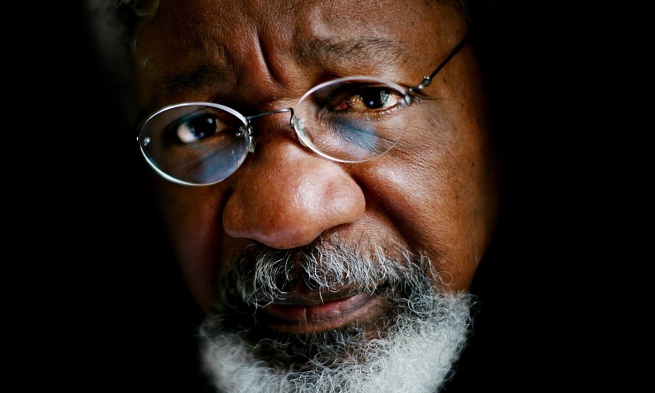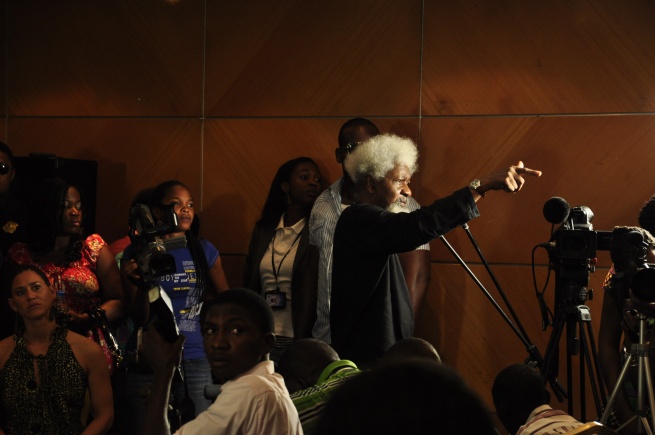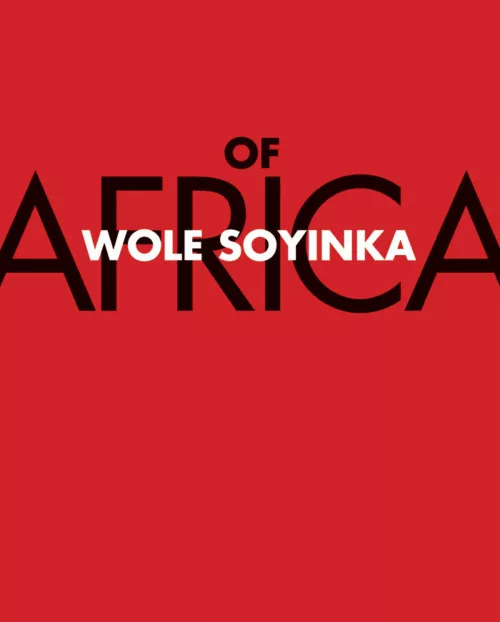Speciale
Of Africa
We are happy to publish the preface of Of Africa by Wole Soyinka, one of the most respected and influential contemporary African writers, the winner of the Nobel Prize for Literature in 1986. The text has been generously offered by the author for publication on Why Africa?. Enjoy your reading.

Wole Soyinka, ph. Graeme Robertson
What does the continent known as Africa possess that the rest- or a greater part- of the globe does not have already in superabundance? These, obviously, cannot be limited to material or inert possessions-such as mineral resources, touristic landscapes, strategic locations-not forgetting the continent’s centuries-old designation as human hatcheries for the supply of cheap labor to other societies, East and West. There also exist dynamic possessions-ways of perceiving, responding, adapting, or simply doing that vary from people to people, including structures of human relationships. These all constitute potential commodities of exchange-not as negotiable as timber, petroleum, or uranium perhaps, but nonetheless recognizable as defining the human worth of any people-and could actually contribute to the resolution of the existential dilemma of distant communities, or indeed to global survival, if only there were known about or permitted their proper valuation.
There is also of course the aspect of negative attributes, one whose very nature constitutes a burden on others. We are speaking here of a condition where the unravelling of a part can menace the health or survival of the whole-a rather inglorious route to claims of significance, of demanding the attention of the rest. If we closed in just on Africa, ignoring the rest of the word for now, instability in the Congo or the Chad regions constitutes threats that must compel the continent not only to sit up and take notice, but to act preventively to stem the tide of destabilization outside the immediately affected borders. The barely resolved crisis in the oil-producing Delta region of Nigeria was a matter of global concern that spanned more than a decade. The same connectivity applies to the internal affairs of every nation across the globe. Just to shift parameters and direction, the once seemingly impregnable economies of Europe have become, in recent years, such zones of grave concern to the younger African nations, that Europe may be said to matter desperately to African nations in an unprecedented qualitative shift since colonialism and the initial phase of decolonization.
Ultimately, however, it is its humanity, the quality and valuation of its own existence, and modes of managing its environment-both physical and intangible (which includes the spiritual)-that remain the primary, incontestable assets to which any society can lay claim or offer as unique contributions to the attainments of the world. This interrogation constitutes our primary goal in its limited excursion into Africa’s past and present.
For many, Africa is more a concept than a bounded space, which means, in turn: more ”concepts” than simply one. It is at once part wish fulfilment and part reality, part projection and part historical distillation, part fiction and part memory. It is, of course, generally acknowledged as a warehouse of untapped natural resources. Even as Africa exists as a desire for some, so does it constitute a nightmare from which others pray to be awakened, a piece of history’s tapestry whose threads can be unravelled without loss of definition to the rest. Yet many also appear eager to participate in this enticing but dubious banquet, convinced that Africa remains a space of infinite possibilities, one that only awaits its day of fulfilment. Of these, a fair number are resolved to be present at, and be part of, that event. This breed is ubiquitous. Immigration officers recognize them on sight. When they are pushed out of one gate they do not really leave until they return through another. “I get expelled from Africa all the time,” I have heard one such declare, suiting the familiar saying to his latest immigration bout, “but no one can expel Africa from me”.
These contending viewpoints do not belong to any specific groups-national, racial, religious, and so forth-nor are they mutually exclusive. We shall find Asians, Europeans, and Australians, progressives and reactionaries, capitalists and socialists, racists, idealists, investors, humanists, and technocrats espousing or repudiating one or all of these perspectives, and perhaps an equal number shifting grounds from one year to the next-it all depends on whether there has been another Rwanda, an underwear bomber from Nigeria, killer gas deposits in Lake Nyos productively tapped, or a new Nelson Mandela sprung to prominence in the slums of Malabo.

Wole Soyinka, ph. Tangerine Vodka
Africa-concept or reality-is an acknowledged continent of extremes, and, by the same token, it is hardly surprising that it draws extreme reactions. Africans themselves are just as divided in their responses or strategies of accommodation-acquiescing, protective, resigned or fiercely defensive, identifying with, justifying or dissociating themselves from what is apparent or presumed to lie beneath the surface. The increasingly accepted common ground, both for the negativists and optimists, is that the African continent does not exist in isolation, not has it stood still in a time warp, independent of history. On the contrary, the continent is an intimate part of the histories of others, both cause and consequence, a complex organism formed of its own internal pulsation and external interventions, one that continues to be part of, yet is often denied, the triumphs and advances of the rest of the world.
The contents of this book derive from a natural, sometimes frustrating preoccupation with this chameleonic entity, since it happens to be one from whose definition, in general, I also derive mine. They revisit propositions encountered under widely different circumstances-university lecture halls, international conferences, roundtables, radio and television programs. Some have proceeded from or have been shaped by, it must also be admitted, the gamut of casual encounters in which the Africa Phenomenon became an issue. These encompass magisterial, superior attitudes such as, “But look here, let’s face it, you must admit that there is something of a problem about your peoples-look what’s just happened in…/look at the scale of corruption in…/with just a fraction of Africa’s natural resources, compare…” These are sometimes pityingly nuanced as invitations to the club of the exceptional breed from a zone of dread and avoidance.
At the opposite end is the reassuring consensus on African traditional arts, all the way to optimistic, even enthusiastic prognosis for her economy-“Africa is the next great economy to hit the world after China, mark my words. Give it another twenty years and you’ll see.”-all of which makes one wonder if we all apply development yardsticks in assessing progress for such a vast continent. Then there are variations where an individual-an overnight notoriety or incorrigible ruler-is blithely conflated with the totality, so that one is expected to accept the brutality of one sadist or the clownery of another in international caucuses as proof of the savagery or imbecility of an entire continent. A sigh of relief should result when the subject turns to Africa’s explosive soccer talent, virtually the only guaranteed zone of unforced, objective, (seemingly) knowledgeable pronouncements, but, alas, that is no solace to a nonenthusiast of that global pastime of mass hysteria.
There is one encounter, a quite recent one, that stands apart, an encounter which, in an ironic way, pushed even deeper the primary thrust of my partisanship, since the historic import of that incident appeared primed to undermine an antistereotypical conviction I have tried to render explicit on these pages. It took place in Bayreuth, Germany, in November 2009. I had referred, during the course of a lecture, to the controversy that took place a year earlier over the production of the opera Idomeneo by the Deutsche Oper (details in Chapter 8). Fears had been expressed about offending religious sensibilities through the opera’s supposedly irreverent portrayal of religious avatars and prophets. In my address I pointed out that both Islam and Christianity had been guilty not merely of physical atrocities on African soil, including enslavement of the indigenes, but of a systematic assault on African spirituality in their contest for religious hegemony. Therefore the claims of either religion to mutual tolerance, I proposed, were still limited to the binary insularity of the world’s incorrigible hegemonists, since they have proved incapable of taking into consideration the rights of other religions to equal respect, equal space, and tolerance. Still-as frankly championed between these covers- I offered that, for that very reason, those “invisible” religions of the world occupied a unique position to act as neutral arbiters whenever the two rivals went for each other’s throats.
At the dinner that followed, an interjection that his elicited from a young man, perhaps thirty years of age, proved to have implications far beyond the scope of my speculative intent. Its offensiveness was trivial; more critical was its indication of a deeply embraced credo-not just for that individual but for an absent ideological coterie whose views he had only articulated. I heard not one voice but many, from across Europe and other continents. Usually suppressed, it nonetheless only awaited a chance to burst forth-and not merely in abrasive words across a dinner table, but in organized bouts of xenophobic violence. His remarks went thus:
Africans, you must admit, are inherently inferior. You must be, or other races would have not have enslaved you for centuries. Your enslavers saw you for what you are, so you cannot blame them.
It was that stark, delivered with precision, like a well-rehearsed position statement. The table- at least the portion within hearing-fell quiet. With equal quietness I transferred to another place at the table. A few moments later the young interlocutor also left, unannounced.
“The good, the bad, and the ugly,” a popular Nigerian columnist once sighed in a fit od frustration over the improbable nation into which he had been born without-he protested-any prior consultation! The title of that spaghetti Western often appears to have been tailored for the entire continent, but then, is that not the realistic condition even of the most advanced of Western and Asian nations, even without such portents as the incident I have just narrated? Out exposition makes a point of keeping this constantly at the foreground of facile, generalized summations of a diverse continent and its peoples. At base, however, and of greater interest to this contribution that one revelation of racist indoctrination, or indeed effusive eulogies, it proposes, very simply, that History has erred. All claims that Africa has been explored are as premature as news of her imminent demise. A truly illuminating exploration of Africa is yet to take place. It does not pretend to take place even on the pages of this book, whose scope is limited to retrieving a few grains for germination from the wasteful threshing floor of Africa’s existential totality. One hopes they will sprout a new breed of explorers for the relay race towards a deeply craved Age of Universal Understanding-Africa inspired.
This text is a courtesy of Yale University Press
With the support of 







